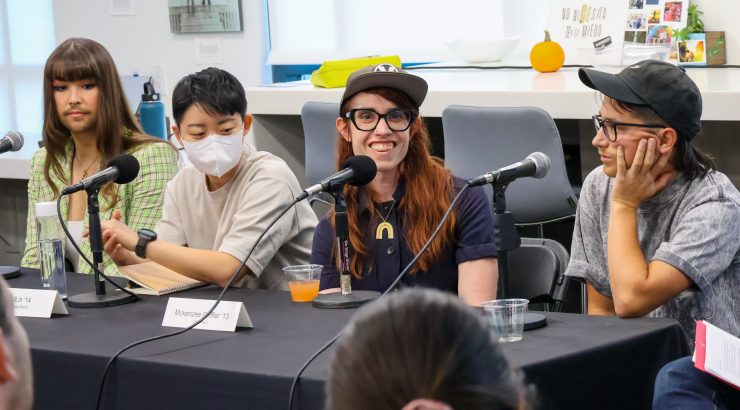
A Discussion on Trans Health with Chapman Alum Engaging the World: Leading the Conversation on Health Equity
November 27, 2023
As part of the Engaging the World: Leading the Conversation on Health Equity series, Wilkinson College of Arts, Humanities, and Social Sciences and Crean College of Health and Behavioral Sciences recently hosted a Trans Health and Wellness panel featuring trans Chapman alumni who are active in the community.
According to the panelists, there was no visibility on campus for trans students during their time at Chapman. Chapman Alumni Addison Rose Vincent (’15 Peace Studies and Women and Gender Studies; Business Administration minor), Mckenzee Griffler (’13 Film Production; Advertising minor), MLin (’14 Film Production; Business Administration minor), and Tuck Woodstock (’13 Film Production, English minor) have all made conscious efforts since graduating Chapman to support the trans community through participation in non-profit organizations like LA Pride and education through podcasts, journalism, and Instagram.
“When I came out as nonbinary, I believe I was the only trans nonbinary student on campus,” said Vincent (they/them), noting how isolating their experience was. Vincent wanted to push down boundaries and decided to rush for a sorority on campus.
“It is important to be visible, and take up space,” said Vincent, but they found that at the time, seven out of eight sororities on campus had bylaws barring anyone from joining who was not ‘assigned female at birth.’
The experience was exhausting, but Vincent believes it is crucial to create visibility within spaces that would not otherwise have representation. “If I wasn’t going to do it, no one would,” claimed Vincent.
The panel also addressed health care issues facing the trans community, in keeping with the ETW theme of health equity
Navigating the healthcare system as a trans person is far more emotionally and physically taxing than people want to acknowledge. In order to access gender affirming care as a trans person, “you need two letters ‘verifying’ your transness, one from a therapist and another from your provider,” stated Vincent.
Persistent, well-documented gender dysphoria is often mandatory if someone is going through their insurance, usually the only way trans people afford gender affirming care. When letters of verification are obtained, finding a doctor who can provide the services needed is near impossible due to the lack of education within the medical community and some providers entirely refuse assistance to trans people seeking care. There is a concerning amount of misinformation regarding testosterone and estrogen uses, as well as a lack of effort within the medical community to provide safe, affordable, and accessible healthcare to trans people.
The alumni panel spoke about having to unfortunately ‘diagnose’ and ‘prescribe’ themselves because their provider’s advice was inaccurate and detrimental to their health. Trans people who cannot rely on the healthcare system to support them often turn inward to their local communities, sharing extra testosterone or estrogen when possible and providing emotional comfort when they have the capacity.
Trans wellness is achievable, but it’s hard to come by. According to the panelists, solutions would include medical practitioners spending time speaking directly to community members in order to learn the best way they can provide care to their patients. Trans wellness comes from a place of striving for trans liberation, trying to challenge institutions, narratives, and people who do not want trans people to be themselves, challenging gender altogether.
“Across the country, the trans community is targeted by transphobic rhetoric, violence, and legislation fueled by misinformation and bigotry. Interpersonal and structural violence put trans people’s lives, health, and well-being at risk every day,” said Dr. Joshua Liashenko, Director of LGBTQ Studies. “The Chapman community was fortunate to host four incredible trans alumni panelists who graciously offered their expertise to the conversation. They effectively gave us an experience-informed snapshot of trans health today while highlighting the work that is required from us all to achieve trans health liberation and equity.”
Minor in Lesbian/Gay/Bisexual/Transgender/Queer Studies
The LGBTQ Minor offers students the opportunity to analyze for themselves facts, theories, research and realities concerning diverse lesbian, gay, bisexual, transgender, and queer people, communities and histories, and the ways in which race, class and other dimensions of identity and experience impact LGBTQ people, histories and politics.
For more information on the Interdisciplinary Minor in LGBTQ Studies, please visit the program website!

